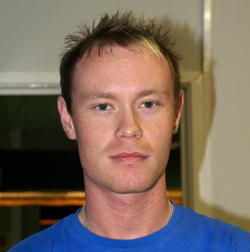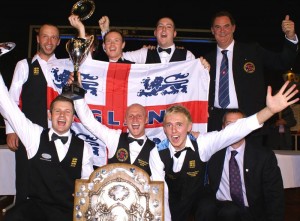
A semi-finalist at the recent ET2 event in Rotterdam, Wallsend’s Gary Wilson is hoping that result will just be the beginning for him, as he looks to establish himself on the main tour following his return to the professional ranks this season.
I caught up with Gary earlier this week to chat about his journey back onto the main tour, following a seven-year absence, the challenges that he faces, his ambitions for the season ahead, and much, much more…
PSB: Hi Gary, first things first, you had a great run to the semi-finals at the recent Rotterdam Open, defeating professionals in every round including Jamie Cope, Joe Swail & Mark Davis, before narrowly losing out to Mark Williams. What was that like as an experience and what do you take out of that run?
Gary Wilson: As an experience, to be honest I am waiting for these kind of results to happen more and more. I am 27 now and in my own mind I haven’t achieved what I feel that I could have achieved – yet. So the run wasn’t so much unexpected and what I take from it is that it was a good result and I’m happy with it, because it’s still not easy getting to the semi-finals of a professional event.
But at the same time, I want more of that. This is what I want to do, I want to get to those sorts of stages, earn decent money and try to make a living out of the game properly.
So yeah, it was a good result, but there is more to come hopefully.
PSB: In the semi-finals you were 3-1 up against Mark Williams too?
GW: Yeah and I chucked it away to be honest, Mark will tell you that himself. If I’m being totally honest I didn’t play that well all the way through the tournament but what I did have, which I’ve obviously gained through years of experience, is I’ve got really good battling qualities.
Even when I’m playing badly, I can still take players to deciding frames and win games even against professionals. That’s one thing that I have always had for some reason, I have always been able to win games when not playing well.
It might sound daft obviously because I’ve not been to the semi-finals before, but I didn’t actually play that well to get there, other players struggled against me. So that was quite a pleasant surprise really, happy to take away the money from it, but I know I can do better.
PSB: What was the tournament like generally?
GW: It was good, I enjoyed that one. I think it’s one of the better ones. I think the only venue that I have been to in the European ones that I think was really good in terms of the size was the Antwerp one in Belgium. I think a lot of people liked that one.
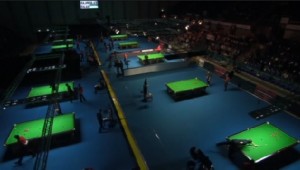
The Rotterdam Arena
But that one in Rotterdam, it’s a really nice place and the venue was good as well. There was plenty of room for people to watch and stuff so I enjoyed it. I’d say it was up there, if not the best that I have been to of the European events.
PSB: It follows a decent start to the season, qualifying for the Wuxi Classic and beating players like Peter Ebdon and Mark King in Bulgaria– what do you make of your start to 2013/14 so far?
GW: Someone asked me this the other day and I basically said it has been 50-50 to be honest. If you look, the only matches that I have lost so far this season have been deciders, so that’s the annoying thing.
I’ve got that in my brain. In one respect I’m so close to winning those games and doing really well to start the season and in the other I know that when I am getting beat, It is only by that odd frame, so it’s a good and bad thing.
I take positives out of it and I take negatives. It’s not a bad start.
PSB: You are the highest ranked of the ‘new’ players to the tour this year so far…
GW: Yeah I am top of those that have come on, but realistically I am not looking at them. I’m wanting to try and push forward and try to be in the top 64 after two years. That’s what I am heading for and the sooner I can do that, the more pressure it eases. I don’t really want to be looking at the rankings too much.
PSB: Last time you were on tour back in 2004-6, the snooker landscape was obviously very different – how does it compare and how excited are you by the opportunity to play not only in PTCs, but also at the last 128 of the main events.
GW: It’s brilliant. It’s the perfect time to play on the tour now, compared to what it has ever been since I have played anyway. It wasn’t even a tour compared to what we are playing now. When I played the first time it was just six tournaments a year and if you finished high enough you got to play again! I hardly made any money out of it; I think I lost money in fact.
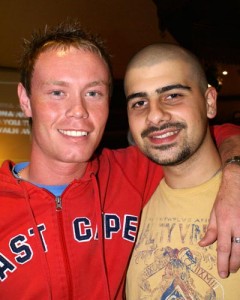
Gary with former pro Michael Georgiou
Now you can actually be proud to call yourself a snooker player because it’s a proper tour. It’s proper tournaments, it’s proper prize money, plenty of them and you are playing all year round so it’s more of a proper job now than it has ever been, which I like about it.
It is what I have wanted to do and what I hope I can do full time.
PSB: What did you learn from your first couple of years, what did you learn from that period?
GW: [laughs] Playing very badly, winning here and there, losing here and there and basically missing out by one match to stay on the tour. That’s all I will take from them two years really, playing badly and not getting to where I wanted to get to.
I think I’ve learned a lot more in the years when I was an amateur again. I don’t think in terms of game, my game has always been the same. I just think in terms of how to win if that makes sense? It’s just an experience thing.
It is not something you can learn, just something that happens over time I think. I have learned how to win more when I am struggling. I think I’ve got a better all-round game now than I maybe did then.
PSB: Does it help having a two year card instead of just one?
GW: Yeah definitely, that eases the pressure as well, so I can just concentrate on playing.
There are that many tournaments over the two years that every tournament isn’t crucial, where it was before. You can just go in and try your best, try to win and earn some money and go on to the next one without any sort of pressure.
PSB: Have you got any particular aims, I guess like you say it is to try and get into the top 64 as soon as you can isn’t it?
GW: Yeah that’s basically my only aim, well in terms of rankings anyway. I’d like to get into that top 64 bracket as soon as possible, that’s on the money list you are looking at really, because that takes effect at the end of the season. Just keeping an eye on that money list and getting in the 64 as quickly as I can.
The other target, obviously I reached the semi-final in Rotterdam so I think my next target is going to be to try and reach the final of a PTC. And then just go from there, one target at a time. I was always taught by my ex-coach Stan Chambers just to give myself targets and do one at a time.
Name the pros – England’s 2007 Home Internationals Winning Team
I didn’t really have any this season other than the rankings to be honest. I hadn’t really been anywhere towards the latter stages of the big tournaments in that respect but now that I have got to the semis of that event, I have taken that as a target and now I want to reach one step further, which is to try and reach a final.
PSB: Lu Ning has just won the World Under-21 Championship, nine years after you did, beating a string of players who have gone on to be professionals – tell us a little about that experience…
GW: That’s one of my best memories to be honest, as a player, one that I will take to the grave if you want! One of the two highlights I would say of my career so far because it was a massive thing to win that tournament at my first attempt.
I already knew that I would be a professional for the following season and I just remember playing really well and really solidly throughout the whole tournament, making breaks and beating Liang Wenbo in the semis. I just take good memories from it really, it was one of my better achievements and one that I will always remember.
PSB: What was Liang like at the time, was he as attacking as he is now?
GW: Yeah basically, he was just a very attacking player! Pretty much how he was a few years ago when he got to the Crucible and he was playing really well. Just like that, he was taking all sorts of pots on, but getting them most of the time. I think his only weakness at the time was that one or two he did take on, he missed and left me a chance and I was playing well enough to capitalise on that.
What I remember from that semi-final in the world under-21’s was the write-up in Snooker Scene or something and I’ll always remember that the match was a very good, high standard because it was 8-6 and basically every frame had a break above 70. I remembered that as one of the best matches I have ever played in.
PSB: And I think that you played Pankaj Advani and Aditya Mehta too, the latter who has just won the World Games of course…
GW: Yeah I played Pankaj in the last 16 I think and then Mehta in the quarters.
It was actually a big turning point in that competition when I played Mehta because I was 3-1 down and it ended up where I needed a snooker on the green. I got that, cleared up and forced a re-spot.
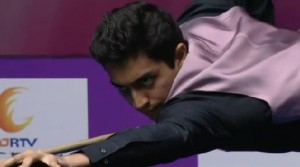
Aditya Mehta
It was only first to five in that match and I thought to myself if I win the toss, I’m going for the double. I lost the toss, he put me in and I went for the double and it was a massive turning point, because I doubled the black in the corner off that shot.
PSB: From the re-spot?!
GW: Straight from the re-spot. I put the white in the D and doubled the black into a corner. That would have either been 4-1 or 3-2, first to five so it was a massive turning point. For some reason I just thought from then it was my tournament, nobody could beat me from there.
PSB: Following relegation in 2006 you spent a number of years trying to get back on the tour via the PIOS, Q School and other international events, often coming close – how hard was it to maintain belief in your ability and to stick at it? Did you ever consider doing anything else?
GW: In terms of how I felt, I felt the same as probably every other snooker player you will probably speak to, I’ve felt like packing it in a million times [laughs]. You will speak to any player and they will all tell you the same thing, there’s always been times in their career where they have thought sod this!
It’s not that I didn’t believe in my ability deep down because I did, but I just thought…you are always doubting yourself, what is going on. It took a lot longer than I thought that it was going to [to get back onto the tour]. I dropped off and I honestly thought that within that year, or if things didn’t work out that year for whatever the reason, definitely the year after, I would get back on and it just didn’t pan out.
I didn’t play that well, I started doubting things, doubting things about my technique, my cue action, about all sorts. I just went through a massive phase really, I didn’t enjoy what was going on and I didn’t really think I could bother playing any more.
I did still know deep down that I was good enough and that I could do it, but I didn’t know how to get around it. I changed a lot of things technically really. I was very unorthodox when I was first on the tour. I am still slightly unorthodox in that I cue down one side, one eye.
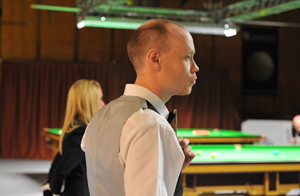
Gary in Sofia earlier this season
But most of the other things I do technically are far better now than they were then. I had habits that I had got into that didn’t make me play bad necessarily all the time, but when it mattered under pressure, sometimes I would miss certain balls that I thought I should never be missing.
It just played on my mind and I just thought while I was off the tour for three or four years it was getting to the point where it was beyond a joke now. I was nowhere near where I wanted to be, I was still not back on the tour, I’ve got nothing to lose and I just decided to change everything about what I was doing, to go for broke. It took a long, long time to get used to playing more like a normal player.
I changed things technically and it took a lot of getting used to. I did feel like it was for the better but it took a couple of years before I felt like that. Then yeah, I got back on and I’ve never really looked back since. Things are going for the better so it must have gone the right way at that time.
I don’t know where I would have been had I not gone for broke and changed things.
PSB: What did you prefer out of the PIOS and Q School?
GW: I liked the structure of the PIOS better, in terms of being eight tournaments and the rankings over a longer time.
The tables weren’t as good, which was the downside because the cloths at Pontin’s weren’t recovered properly, like to the standard they would be at the Q School now or at the qualifiers. They were left on a lot longer.
The Q School I think is a bit too one-off. I prefer it over a longer course, but hopefully I don’t have to worry about that any more!
PSB: Getting back on through the PTC route – how big a challenge was that and was that a big objective at the start of last season?
GW: Yeah definitely, because the season before I played in the PTCs and I think I only missed out by a few spots and I knew that I was quite capable of doing better, so it was one of my main targets to get on through the PTCs.
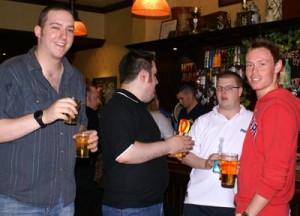
Gary with Leeds pro David Grace
When I played in the World Amateur Championship, in November or December, I knew then that was a great opportunity as well to get on, because I knew that the winner of that would get a place. I would gutted to lose the final because I knew that was a guaranteed spot there and then if I had won that final.
But as it happened, while I was playing that, I was sitting comfortably in the PTC list, so I knew that I only had to win a match or two in the next event and I would have been alright in the PTCs.
PSB: What was that tournament like, the IBSF?
GW: Yeah it was good. I had just been there for the PTC just before that, so I had to go home and back again to the exact same place for the world amateur, so it wasn’t great going to Bulgaria for that long. But as a tournament it was fine, I took my girlfriend with me as well and it was alright.
I was gutted to get beat in the final to be honest. I wanted to win that not just for a tour spot, but because it is the best amateur tournament that you can possibly play in. I had never played in it before and with me thinking that I had a good chance to get on the pro tour the following season, it could possibly be the only chance that I would ever get to play in it. I really wanted to win that to go with the under-21 title. It is a big tournament to go on your CV.
PSB: For those who haven’t seen you play before, how would you describe your playing style?
GW: I’d say I’m a good all-rounder. If you ask players I play with, they tend to say I am a heavy scorer, especially in practice. But even in matches I can score heavily, there are often a lot of breaks on the board when I play.
I wouldn’t say that I am an out and out great long potter or exceptional on any part, but I am a good all round player and I can score heavy, I’d say that is my biggest attribute.
PSB: I was talking to Roland from the Snooker Island forum and he said that you were the man to beat when you were 11 in the Gateshead Pro Ams…
GW: In my junior days aye, I was definitely the one to beat! I think I reached the final when I was 11, I beat Neil Mosley in the semis, he was a great amateur player, he just didn’t really do anything when he turned pro.
But in 1993 he won the World Amateur Championship, English Amateur Championship and European Amateur Championship all in the same year and he was winning everything at that point. Then a few years later, I beat him in the semis of the pro am when I was 11 and that was a big scalp for me, I remember that one.
As little as it was, you take certain things from your career. Then I got beat in the final by someone who wasn’t half as good!
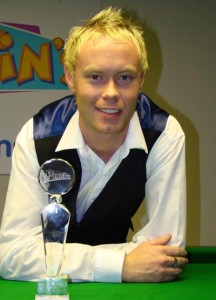
A winner at Pontin’s
PSB: When did you start playing?
GW: I was eight years old, it is probably the same story you’ll hear from any snooker player but my dad took me down to the club because I had a little table in the house when I was younger and I was quite good to start with.
My dad realised that I had some potential and I just absolutely loved it. By the next year I had a century by the time that I was 9 years old and that was when Stan Chambers noticed me. He started taking me down to the pro ams in Gateshead when I was eight or nine. I beat my first player when I was eight and a half. He was a county player at the time and obviously that was massive for the local papers. Stan used to write for the papers then and put it in.
PSB: You do get some decent coverage in the Chronicle don’t you?
GW: Yeah, like I say that was due to Stan, he writes for the Chronicle and obviously he is close to me as he coached me from when I was younger, so when I do anything worth noting he is always trying to put it into the paper as well.
PSB: There are a couple of other players from your area on tour this year, Elliot Slessor, Ryan Clark – who do you tend to practice with?
GW: Yeah I play with Elliott. He plays in the same club that I play in, so we play together a couple of days a week at least. The time I have got, I probably play in the club three or four times a week and two of those days I play Elliott.
PSB: What sort of practice conditions have you got?
GW: Not good to be honest. We still play on club tables, we just play in a snooker club and there are no tables done up or anything, to play on a match style table.
What Elliot has been doing, because he’s got more free time than me, is to travel around and try to play different players, but for me with work, I obviously just have to put up with playing in the club when I have the chance to practice and just play on the club tables.
We have been speaking to the owner recently and he might be putting in a table to get redone, he’s going to try and put one up to match standard by getting some cushions put on, tightening the pockets and putting a good cloth on, so hopefully in the next few weeks we will have something like that in the club and that will be much better obviously.
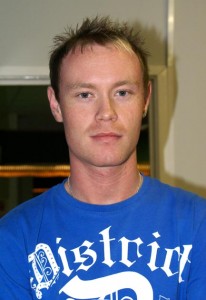
PSB: What’s Elliott like as a player?
GW: Yeah he’s good, he’s turning 19 soon. He’s got a good head on him really. He’s obviously a very talented player.
A lot of players that age don’t have much of a tactical game or much of a head really but I think to be honest, he said that with us practising a lot, he has maybe learned a bit off me in that respect. He has a nice tactical side to his game and doesn’t get too down when he’s playing badly. He’s got to try and grind it out and get results when he’s playing badly.
It’s good to practice with him learning that because you do have some good close matches. It might not necessarily be the greatest standard, but you know you are having good hard matchplay and that’s what you want to be practising really, so it’s good.
PSB: You mentioned work, I also understand that you are looking for a sponsor at the moment as well?
GW: Obviously that money in Rotterdam has helped a bit but that is not going to last long. I could do with a sponsor as soon as possible so I can actually think about quitting my job, because I’m still working as a taxi driver.
It’s what I was doing before, still running around in a taxi doing jobs here and there. It is a full time job, to keep me going and I am doing around 30 hours per week at the moment, just to get a little bit for myself, paying for things and having time to practise as well.
PSB: How long have you been taxi driving now?
GW: Four years now, I work for Blue Line Taxis, who are probably the biggest taxi firm in the North East.
They are helping me out, by giving me extra holiday until end of the year to help with costs, which basically means not paying them on a weekly basis when I’m not there, if I need to be away for a tournament.
I’m hoping to give it up as soon as possible. A sponsor would change things probably and me doing well, that would change things altogether.
PSB: And now the season gets properly underway, with the bigger events…
GW: Yeah, with better money as well. I was gutted when I went to China, as I say it has been a 50-50 start because it was great to get to China, but it was gutting to get there and not win my first match.
I really wanted to go there and win at least one and I lost 5-4 to David Morris. It wasn’t as if I was playing badly in that one to be honest, I played quite well and I was just hanging on. David played really well in that match so I couldn’t be too disappointed.
Thanks to Gary for his time and best of luck to him for the rest of the season. He will next be in action at the Shanghai Masters qualifiers next Wednesday, when he faces Thailand’s Noppon Saengkham in the opening round.
Many thanks also to Janie Watkins and to Monique Limbos for the use of their photos.
